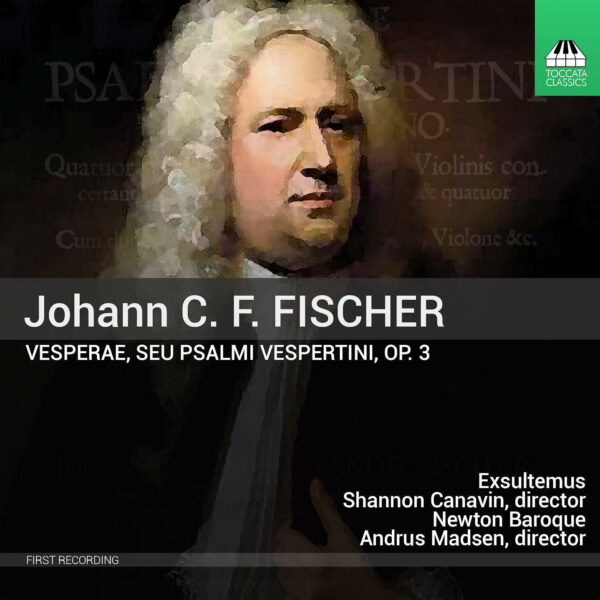Johann Caspar Ferdinand Fischer: Vesperae, Op. 3
Catalogue No: TOCC0364
EAN/UPC: 5060113443649
Release Date: 2016-05-01
Composer: Johan Christoph Pez,
Johann Caspar Ferdinand Fischer
Artists: Andrew Madsen,
Exsultemus,
Newton Baroque,
Shannon Canavin
In his day Johann Caspar Ferdinand Fischer (1656–1746) was renowned as one of the major musicians in southern Germany, especially for his distinctly French keyboard music. His vocal music, by contrast, which has been far less thoroughly explored, looked to Italy for its models, as his captivating 1701 setting of the Vespers reveals. In keeping with the practice of the time, this first recording of Fischer’s Vespers includes music from elsewhere in his output, as well as two sonatas by the Munich-based Johann Christoph Pez (1664–1716).
Exsultemus
Shannon Canavin, director
Newton Baroque
Andrew Madsen, director, organ
Listen To This Recording:
- Blumen-Strauss: Preludium VIII
- Domine ad adjuvandum
- Beatus vir
- Ariadne Musica: Praeludium et Fuga IV
- Confitebor
- Ariadne Musica: Praeludium et Fuga XVIII
- Credidi
- Ariadne Musica: Praeludium et Fuga VIII
- Nisi Dominus
- Ariadne Musica: Praeludium et Fuga III
- Lauda Jerusalem
- Ariadne Musica: Praeludium et Fuga XVII
- I Adagio
- II Allegro
- III Adagio
- IV Allegro
- V Adagio
- VI Gigue
- Magnificat
- I Adagio
- II Allegro
- III Adagio
- IV Vivace
- Lytaniae Lauretanae VII (1711): Salve Regina
Johann Christoph Pez
Sonata in G minor:
Johan C.F. Fischer
Johan Christoph Pez
Duplex Genius sive Gallo-Italus Instrumentorum Concetnus (1696): Sonata Quinta:
Johan C.F. Fischer

Fanfare Magazine :
‘Of the 16 Vespers psalms, Shannon Canavin has chosen five, which are in turn separated, not by antiphons, but in the custom of the time by preludes from Fischer’s Ariadne musica neo-organoedum. Between the final prelude and the Magnificat, Newton Baroque provides a sonata by Pez instead of the hymnus, and another between the Magnificat and a concluding Salve Regina from Fischer’s Lytaniae Lauretanae VII (that for intimacy and charm is almost worthy of its subject). In fact, Fischer’s entire contribution here has a smoothly Italianate feel, songful with transparent, usually two- and three-part counterpoint. … Both Fischer and Pez furnish attractive music, and the performances of both Exsultemus and Newton Baroque are generally worthy of their material. In very good sound that never overwhelms the music with reverberance, this comes recommended.’
—Barry Brenesal, Fanfare Magazine, November/December 2016
Early Music America :
‘Johann C. F. Fischer’s name is now mostly known, if at all, for his keyboard works. This impeccably performed disc of Fischer’s sacred vocal music demonstrates why the Southern German composer was actually quite renowned in his time. […]
These selections highlight the work of an expressive craftsman. […]
Unimpeachable singing, playing, and direction take this material from historical curiosity to fresh experience. Exsultemus’ use of fewer voices (no more than two per part in SATB configuration) actually makes a larger impression in Fischer’s well-sculpted lines while keeping things transparent. […]
Newton Baroque also opts for smaller forces, with just two violins plus viola da gamba/violone and pipe organ. […] Historical explanations aside, this choice works on entirely musical grounds: The organ never overwhelms any other part, adds the instrument’s huge range of sounds, and is played with utmost sensitivity by Madsen. His contributions are felt behind the ensemble even when they’re not heard upfront. Violinists Susanna Ogata and Julia McKenzie are equally nuanced as accompanists and utterly confident as soloists. Douglas Kelley, doubling gamba and violone, partners intuitively with Madsen to make a powerful but unobtrusive continuo. […]
The organ and acoustics at Church of the Redeemer in Chestnut Hill, MA, are rich, reverberant, and captured in warm sound. Fischer may never become a household name, but musical advocacy like this should be more than enough to inspire curiosity.’
—Andrew J. Sammut, Early Music America